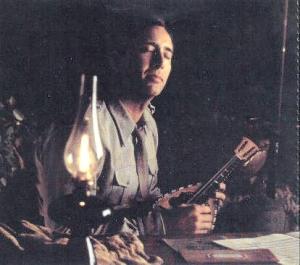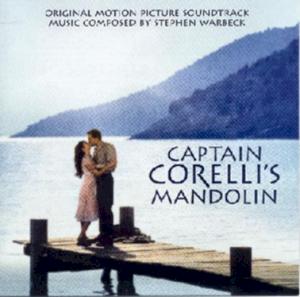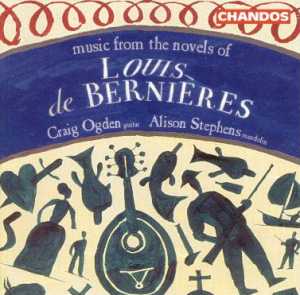The Soundtrack album
Would it surprise you if I said this score featured a lot of mandolin!?
Opening with 'Pelagia's Song', a rather staid symphonic work with the requisite titular instrument in evidence, Oscar winner Stephen Warbeck takes us on a lyrical, somewhat maudlin journey that encompasses a great deal of romance and drama, all accompanied by grand, sweeping orchestral passages, punctuated by more intimate moments supplied by the ever present mandolin.
Apart from the 'Pelagia's Song', the other key motif of the score first appears on the cue 'Horgota Beach', where the mandolin is backed by accordion in a restrained romantic melody and this is heard quite a number of times at various key moments; 'The Mandolin', 'The Guitar', 'On the Jetty' and 'Senza Di Te', the latter with lyrics by Didier De Cottignies and vocals by Russell Watson (who also sings 'Ricordo Ancor (Pelagia's Song)').
To off-set all of this passion there are a number of darker, more dramatic pieces like 'To Albania', 'Surrender', where strings and brass weave a sense of tragedy and loss and the sombre 'The Battle'. Towards the end of the CD there is 'The Aftermath', almost seven minutes of tragic romanticism, which actually nicely sums up the overall tone of the entire score. As a bonus, for those who enjoy operatic songs, there are also Verdi's 'La Donna È Mobile', Norbert Schultze's 'Lilli Marlene' and Enrico Caruso singing Teodoro Cottrau's 'Santa Lucia'.
This is a big, histrionic score with a sweeping range, harking back to soundtracks of old in many ways. There will be those who will absolutely adore it, while others may find its overt sentimentality and theatricality less appealing. Whatever the case, this is not a work to be easily dismissed, even if I did come away with a strange sense of too much of a good thing, much the same feeling in fact as eating two very large slices of chocolate cake! But if you're in the mood for some richly romantic melodrama, then look no further.
Mark Hockley

Ian Lace adds:-
First, an aside. It is a stock and easy target for film critics to go for an actor who is in character. How often do we read "… has a poor unconvincing Irish accent." How do they know how good or bad it is? They probably are from North London and have never set foot in Dublin!". I mention this because I feel that Nicolas Cage has been given too much of a rough ride in his interpretation of Corelli. Granted, he might be a bit too old for the role and sometimes appears a bit stiff, but on the whole he carries it off well - and he learnt to play the mandolin which demonstrates enthusiasm and some dedication.
Which of course brings us to the music and what a delightful score this is - full of old fashioned romance. The main theme incorporating Pelagia's Song is hauntingly lovely, not only romantic but redolent of its sultry, beautiful locale. It is reprised as a mandolin solo (broadening out to orchestral accompaniment in 'The Mandolin') as Corelli serenades Pelagia and she realises she is falling in love with him; and sung with some fervour by Universal's latest high profile singer, Russell Watson (who also sings 'Senza Di Te').
Warbeck's score also has the merit of variety to maintain the listener's interest with the main theme well developed and varied as in the tender nocturne-like 'After the dance'. In contrast, the tragic side of the story has the theme dressed in dark colours with unrelenting thunderous bass drum ostinatos, nervous edgy rhythms and snarling brass. There are so many delights, the soft lilting melody of 'Horgota Beach'. The fun of the Italian soldiers operatic singing in 'La Scala', the Greek Islanders take of 'The Tango', and the beauty of the guitars in 'Agii Fanentes'etc. My only small carp: the character of little Lemoni is poorly developed in the film as opposed to the novel and Warbeck's music for her is (therefore?) correspondingly disappointing it does nothing to underscore her merry, mischievous characteristics. But this is a minor blemish on an otherwise delightful score that deserves the popularity of the music for Il Positano.
Ian Lace

Gary S. Dalkin also adds:-
I have seen this score criticised in various places for being a little detached and understated. Such detachment is actually in the nature of the film, a slow, careful and observational quality of John Madden's direction, which eventually allows the film to have greater emotional impact in the final stages when the full horrors of war hit home. In being simply a good, well crafted and rather old-fashioned romantic war drama, the film itself may disappoint. Especially as being both an adaptation of one of the best loved novels of recent years, and Madden and Warbeck's follow-up to their brilliant multi-award winning Shakespeare in Love (1999). However, Warbeck's score matches the film perfectly, its lucid textures transparent and as beautiful as John Toll's stunning cinematography, his pacing equal to Madden's low key approach. There is little that is intensely dramatic, but with much of the score centred inevitably around the mandolin, supported by Warbeck's own instrument, the guitar, there is much which is really very lovely. The main theme meanwhile, 'Pelagia's Song', presented in instrumental form and also sung by Russell Watson, is a very strong melody of the sort John Barry might have penned had he scored such a story in the 1960's. Fans of Ennio Morricone's romantic scores, or the cinema work of Nino Rota will find much to love here. Those who seek wartime bombast had perhaps better take a trip to Pearl Harbor.
Gary S. Dalkin


The mandolin and guitar music album
It is hardly surprising that Louis de Bernières was both a guitar and mandolin player, albeit for love. He started off with the guitar progressing from ragtime to Bach, to Spanish music. His love of the mandolin grew whilst working on Captain Corelli's Mandolin.
This selection (see below for list of works included) presents music from the late 16th to the late 20th centuries - from Vivaldi to Antonio Lauro excitingly and sensitively played by Ogden and Stephens. Craig Ogden (guitar) brings a colourful flourish to the Spanish pieces with which he especially empathises. Interestingly, Alison Stephens' (mandolin) father was a mandolinist and like Captain Corelli, played his way through World War II!
The Vivaldi Concerto in C sits well on both instruments, and has considerable classical beauty. The Andante of Hummel is gentle and soft; each instrument beautifully complimenting the other. The Villa Lobos pieces are very evocative seemingly depicting sultry Brazilian nights with their languorous chords and sensual melodies. Antonio Lauro's Four Venezuelan Waltzes are short but not especially memorable it must be said. Miguel Llobet's three short pieces on this album are more interesting: 'A Mother's Son'speaks adoringly; 'Amelia's Testament' is equally tender - so too is 'The Master'. Turina's 'Soleares' evokes warm evening sunshine and peasants dancing and drinking until the early hours.
There are four premier recordings: Benedetto Persichini's vibrant and distinctive Polcha variata'; Raffaela Calace's 'Love is a Fool' suggestive of an argument between a dominant man and his pleading lover - a little gem that is wistful, coy and whimsical; Angy Palumbo's 'Petite Bolero' with its exciting vibrant rhythms; and the Anon piece, 'Mis Dolencias' (My Sorrows) sounding just the opposite - joyful - perhaps the sorrows have past?
The music associated with Louis de Bernières' novels is colourful and quite varied - exciting, moody, sensual and evocative. But it seems to create a sense of yearning for something elusive. If you've enjoyed the novels then this compilation will be a heightened pleasure; if not just sit back and enjoy being soothed.
Antonio VIVALDI (1678-1741)
Concerto in C RV 425 *†
Johann Nepomuk HUMMEL (1778-1837)
Andante con variazioni from Concerto for Mandolin in G major *†
Mauro GIULIANI (1781-1829)
Grand duo concertant *†
Benedetto PERSICHINI (c1880/90 - ?)
Polcha variata †
Raffaele CALACE (1863-1934)
Amor si culla (Love is a Fool) †
Angy PALUMBO
Petite Bolero *†
Julio SAGRERAS (b. 1933)
El Colibri (The Hummingbird) *
Heitor VILLA-LOBOS (1887-1959)
Choros No. 1 *
Prélude No. 1 *
Antonio LAURO (1917 - 1986)
Four Venezuelan Waltzes *
Agustin BARRIOS (1885-1944)
Choro de Saudade (A Lament) *
Las Abejas (The Bees) *
Miguel LLOBET ((1878-1938)
El Noi de las Mare (The Mother's On) *
El Testament d'Amelia *
El Mestre *
Anon
Mis Dolencias (My Sorrows -folk tune) *†
Celedonio ROMERO (b. 1918)
Soleares (from Suite Andaluza) *
Joaquin TURINA (1882-1949)
Soleares (from Homenaje a Tárrega) *
* Craig Ogden (guitar) † Alison Stephens (mandolin)
Grace Barber







